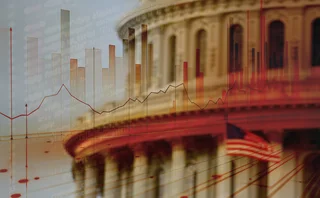
Duffie: CCPs should prep to quash Sifi swap termination stays
Clearing houses need criteria for overriding stays on swap terminations, writes Darrell Duffie
Darrell Duffie is the Dean Witter distinguished professor of finance at Stanford University’s Graduate School of Business.
Bankruptcy law does not cover swaps, repos, deliverable foreign exchange derivatives, securities lending agreements and clearing agreements, among other so-called qualified financial contracts (QFCs). These contracts can be negotiated, if desired, with clauses that allow the counterparty of a firm experiencing insolvency to immediately liquidate collateral, apply close-out netting of gains against losses and terminate their agreements. Conventional creditors, on the other hand, are automatically ‘stayed’ by bankruptcy, and thus forced to wait for whatever recoveries become available to them, usually long after QFC terminations have been processed.
To some experts, the exemption of QFCs from automatic stays is excessive. The point of bankruptcy, they argue, is to make all counterparties wait for an orderly insolvency process in order to maximise the value of the defaulted estate to be shared among them. Bankruptcy exemptions also reduce incentives to monitor counterparty credit quality.
Here, I argue that the efficacy of stay exemptions for QFCs rests largely on the control of systemic risk.
Consider first the case of a firm F with an ordinary lender and a QFC counterparty. Fixing the pricing terms of the loan and the QFC, the lender and the QFC counterparty would each prefer to have as much priority as possible at a potential future insolvency of F. The lender could nevertheless be offered an interest rate high enough to compensate for its loss of priority to the QFC counterparty. The efficient outcome, from the viewpoint of these three market participants, could indeed be one in which the QFC counterparty receives effective default priority. This is more likely if the default of F causes greater expected distress costs to the QFC counterparty, per dollar of contractual shortfall, than to the lender.
Should the CCP be stayed from liquidating the positions of a failing major dealer in order to improve the likelihood that the dealer can be stabilised? Or should the CCP be permitted to stop the potential growth of losses to its other systemic clearing members?
Institutional lenders and bond investors take credit risk as a normal trade-off for yield, whereas QFC counterparties are typically looking for a specific sort of financial performance, beyond merely taking a credit position. It is therefore no surprise that QFCs are usually negotiated with termination rights giving them effective priority. My research with Chaojun Wang finds that under idealised bilateral bargaining conditions, these three players will negotiate the extent of default termination rights for QFCs that maximises the total value to all three players of their contracts, net of all their expected distress costs.
However, what is best for a given firm and its immediate counterparties may not be efficient for the economy as a whole in the presence of systemic risks, because the social costs of these spillover risks are not internalised into bilateral contract negotiations.
For example, a mass termination of QFCs of a failing global dealer could prevent its orderly reorganisation, at least without huge injections of capital or liquidity, which the official sector has sworn to avoid. Massive QFC terminations could also imply a destabilising firesale in the underlying financial markets, another dangerous source of contagion.
Because of these risks, post-crisis legislation – through the Dodd-Frank Act in the US and the Bank Resolution and Recovery Directive (BRRD) in the European Union – gives resolution authorities the power to override the stay exemptions of the domestic QFCs of systemically important financial institutions (Sifis).
Breathing space
Once a Sifi enters failure resolution, the termination of its QFCs can be stayed for at least a short period of time, such as one day – long enough in theory for the Sifi to be made solvent by eliminating some of its loss-absorbing debt. A proposal that would achieve this effect within US bankruptcy law is now being considered by Congress.
Notably, given the heavy concentration of swaps and repos signed in London, the UK’s 2009 Banking Act gives the Bank of England the power to stay the termination of financial contracts, provided that the firm in resolution is meeting its payment obligations. Although this power arises from the UK’s implementation of the EU’s BRRD, there is no reason to expect that Brexit would reverse or weaken it. The Bank of England is also able to stay the termination of financial contracts of the UK subsidiary of a firm undergoing foreign resolution. This power is critical to the safe resolution of a major US dealer.
Some of the foreign law financial contracts of major dealers nevertheless retain early termination rights that are not subject to override by failure resolution administrators. Post-Brexit, this gap might become more significant. US and UK regulators are covering remaining gaps by requiring Sifis to write their otherwise exempt financial contracts to include the effect of temporary stays at failure resolution.
The special case of clearing agreements between major dealers and central counterparties (CCPs) remains problematic. Which is more systemic, the CCP or the dealer? Should the CCP be stayed from liquidating the positions of a failing major dealer in order to improve the likelihood that the dealer can be stabilised and reopened for business? Or should the CCP be permitted to stop the potential growth of losses to its other systemic clearing members by using its contractual right to liquidate the positions of a failing member? Because most swaps are now centrally cleared, and because major dealers depend critically on the continuity of their swaps books, heavy contagion risk arises either way.
Resolution authorities should develop and test criteria under which a CCP would be permitted to liquidate the positions of a systemically important clearing member undergoing resolution. Snap judgments during a crisis, unaided by advance planning, are prone to large mistakes. Many such decisions may need to be made by different authorities, at multiple CCPs, at about the same time.
Only users who have a paid subscription or are part of a corporate subscription are able to print or copy content.
To access these options, along with all other subscription benefits, please contact info@risk.net or view our subscription options here: http://subscriptions.risk.net/subscribe
You are currently unable to print this content. Please contact info@risk.net to find out more.
You are currently unable to copy this content. Please contact info@risk.net to find out more.
Copyright Infopro Digital Limited. All rights reserved.
As outlined in our terms and conditions, https://www.infopro-digital.com/terms-and-conditions/subscriptions/ (point 2.4), printing is limited to a single copy.
If you would like to purchase additional rights please email info@risk.net
Copyright Infopro Digital Limited. All rights reserved.
You may share this content using our article tools. As outlined in our terms and conditions, https://www.infopro-digital.com/terms-and-conditions/subscriptions/ (clause 2.4), an Authorised User may only make one copy of the materials for their own personal use. You must also comply with the restrictions in clause 2.5.
If you would like to purchase additional rights please email info@risk.net
More on Markets
Repo and FX markets buck year-end crunch fears
Price spike concerns ease as September’s surprise SOFR jump led to early preparations for bank window dressing
US senators press CFTC on Japan swap clearing
Boozman and Hagerty urge action on yen swap clearing access to JSCC in letter to US regulator
Traders dredge 0DTE data for intraday gamma insights
Firms such as UBS, BofA and OptionMetrics are investing in continuous net options position monitoring
Cross-currency futures could ease bilateral burden – CME
Quarterly €STR-vs-SOFR contract could be used by Stir desks to manage currency basis risk
‘It’s not EU’: Do government bond spreads spell eurozone break-up?
Divergence between EGB yields is in the EU’s make-up; only a shared risk architecture can reunite them
Long gamma puts brakes on post-election US stock rally
Call selling by ETFs helped fuel largest net gamma positioning among dealers since July
Credit risk transfer, with a derivatives twist
Dealers angle to revive market that enables them to offload counterparty exposures, freeing up capital
Consortium-backed FMX eyes push for FX unit
Formerly Fenics FX, the venue has seen growth from dealers and non-banks using its pegged order types and dark pool liquidity








